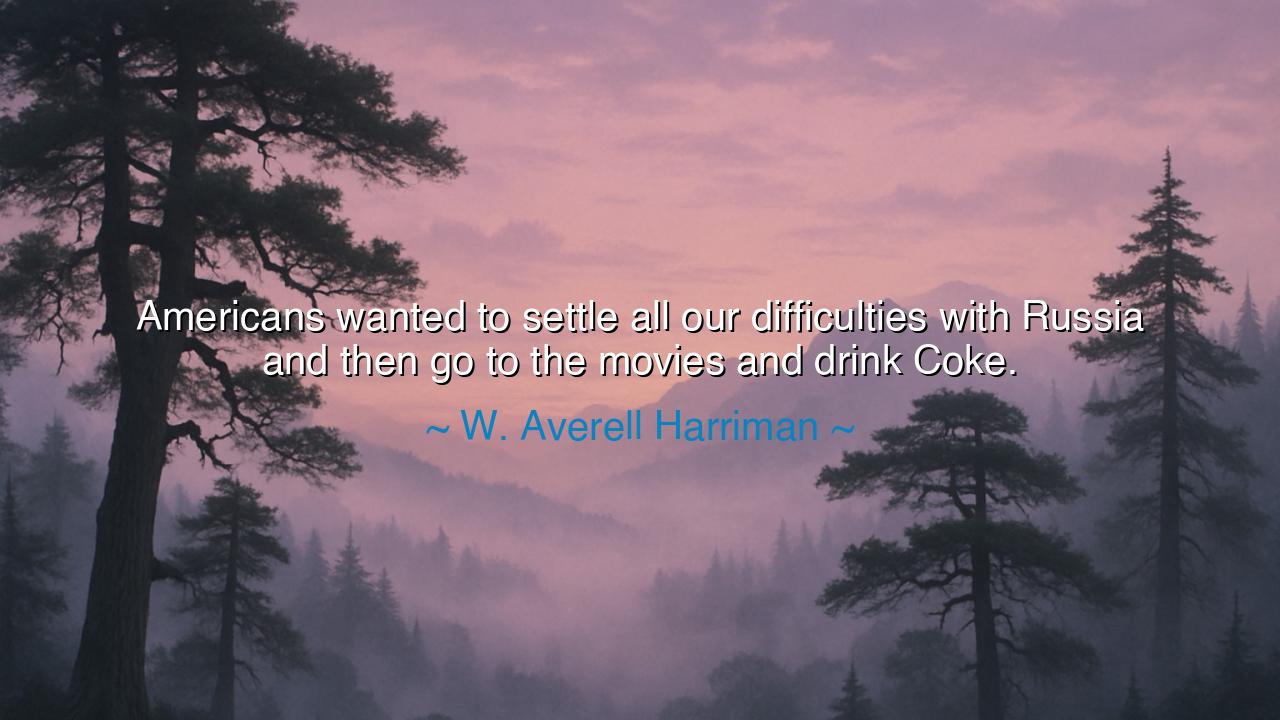
Americans wanted to settle all our difficulties with Russia and
Americans wanted to settle all our difficulties with Russia and then go to the movies and drink Coke.






Hear now, O seekers of wisdom, for the words of W. Averell Harriman carry within them a powerful reflection on the nature of human conflict, desire for peace, and the disconnect between ideals and realities. He spoke thus: "Americans wanted to settle all our difficulties with Russia and then go to the movies and drink Coke." In this, Harriman encapsulates a profound truth about the contradictions inherent in human nature—how we long for resolution and peace, yet too often seek it as a way to return to comfort and pleasure, leaving the deeper challenges of the world unaddressed. His words speak to the fragility of peace when it is pursued not for lasting harmony, but for the sake of temporary relief from the burdens of conflict.
In the ancient world, the pursuit of peace was not merely an escape from difficulty, but a noble endeavor. The Greeks, through the dialogues of Plato and the philosophies of Aristotle, sought not only to understand the nature of the world but to create a society grounded in virtue and justice. But these ideals were not born out of a desire for comfort—they arose from a deep commitment to truth and to the greater good of society. Harriman’s observation about Americans highlights the tension between the idealistic pursuit of peace and the practical reality that many, instead of confronting the complexities of their struggles, seek only the easy resolution that allows them to return to their comfortable lives, represented by movies and Coke.
Consider also the story of Rome’s Pax Romana, the long period of relative peace that Augustus sought to establish across the Roman Empire. This peace, however, was not achieved through simple compromise or temporary relief. The peace of Rome was built on power, control, and often, subjugation of others. It was a peace maintained by force, not by the true resolution of the deep cultural, political, and social conflicts that defined the Empire. Like Harriman’s remark, the illusion of peace in the Roman Empire was often desired by the populace, who longed for the comfort of stability, without acknowledging the true cost of that peace. It is a powerful reminder that, in the pursuit of peace, we must never forget the deeper sacrifices and struggles that it often requires.
In this context, Harriman’s insight speaks to the tension between the immediate desire for relief and the deeper responsibility to face the causes of conflict. Think of Socrates, who rejected the easy path of popular opinion and instead chose the path of truth, even when it led to his own death. Socrates did not seek the comfort of being liked or the ease of simply going along with society's demands. He confronted the uncomfortable truths of his time, questioning the moral and ethical foundations of Athenian life. Harriman’s words challenge us to consider whether we too are seeking only temporary relief, rather than confronting the deeper, more complex issues that require our full engagement and commitment.
In the same vein, consider Martin Luther King Jr., whose struggle for civil rights in America was not just about achieving quick victories or seeking comfort. His was a long and difficult path, one that required confronting the deep injustices of society. King could have sought the easy road, merely offering platitudes about peace, but he chose to engage in difficult struggle, knowing that true change and reconciliation could only come through facing the full complexity of the issues at hand. Harriman’s reflection on Americans’ desire for peace with Russia, followed by a return to leisure, calls us to reflect on our own tendencies to seek comfort instead of working through the real challenges that lead to lasting peace.
The lesson here, O children of the future, is clear: True peace and resolution do not come from seeking temporary relief or escaping into comfort. Peace is not a fleeting moment of enjoyment, but a sustained commitment to addressing the deep challenges of our time. Whether in international relations, personal conflicts, or societal struggles, peace requires courage, engagement, and sacrifice. Do not seek peace merely to return to comfort, but to confront the issues that divide and hurt. Like the great thinkers of the past, who sought to understand the complexities of human life, we must strive to find solutions that are built on understanding and action, not just on temporary escapes.
So, young ones, take this wisdom to heart: Do not seek the easy path of peace that leads only to comfort, but strive for a peace that comes from truly understanding the challenges before you. Engage deeply with the conflicts that matter, whether in the world or within yourself, and do not settle for shallow resolutions that only mask the underlying problems. True peace, like true wisdom, comes not from avoiding difficulty, but from embracing it, facing it with courage, and transforming it into something that benefits all. Seek to create lasting solutions—not just the fleeting relief of escape—but the true reconciliation that builds a more just and harmonious world.






AAdministratorAdministrator
Welcome, honored guests. Please leave a comment, we will respond soon